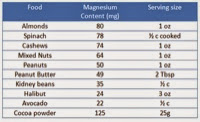Recently re-discovered as an overlooked key to good health, a number of medical researchers are recommending increases to the RDA for magnesium — sometimes suggesting as much as double the current recommendations — to ensure protection from diseases such as osteoporosis and hypertension.
Even the best of the best organic soils are depleted of these precious minerals. And non-organic farming has virtually no nutrients in it. Furthermore, there are many ways in which Magnesium is lost from the body, e.g. alcohol, coffee, black tea, grains, soy, most pharmaceutical drugs, calcium supplements.
Regular supplementation is a reliable way to boost your magnesium levels.
Benefits of Magnesium:
1. Better sleep - The sleep regulating hormone melatonin is disturbed when Magnesium is deficient. Furthermore, Magnesium brings balance and controls stress hormones. Stress and tension are often reasons why people suffer from insomnia in the first place.
2. Relaxes the nervous system - Serotonin, which relaxes the nervous system and elevates mood, is dependent on Magnesium.
3. Bigger, stronger muscles - Magnesium allows the body to produce more Insulin-like Growth Factor which is a major contributor to the growth and strength of muscles. Furthermore, adenosine triphosphate is the cell's energy store, and is created with help from Magnesium.
4. Better flexibility - Magnesium loosens tight muscles. Without Magnesium, muscles do not relax properly and cramps occur. Magnesium is important for flexibility, because low Magnesium results in a buildup of lactic acid, causing pain and tightness.
5. Bone integrity and strength -Magnesium helps to fix calcium properly. It may blow some people's mind that the calcium supplements they're taking are not only useless, but are actually contributing to osteoporosis! There are actually about eighteen essential nutrients that contribute to bone health; Magnesium is definitely one of the most essential, because it stimulates a particular hormone called calcitonin. It also suppresses a hormone called parathyroid that breaks down bone.
6. Remineralizes teeth - Magnesium deficiency causes an unhealthy balance of phosphorous and calcium in saliva, which damages teeth.
7. Alkalizes the body - Magnesium helps return the body’s ph balance. Magnesium reduces lactic acid, which is partly responsible for post-exercise pain (Delayed Onset Muscle Soreness).
8. Hydrates - Magnesium is a necessary electrolyte essential for proper hydration.
9. Helps to relieve constipation -Magnesium can be used to cleanse the bowels of toxins.
10. Enzyme function - Enzymes are protein molecules that stimulate every chemical reaction in the body. Magnesium is required to make hundreds of these enzymes work and assists with thousands of others.
11. Diabetes - Magnesium enhances insulin secretion, which facilitates sugar metabolism. Without Magnesium, glucose is not able to transfer into cells. Glucose and insulin build up in the blood, causing various types of tissue damage, including the nerves in the eyes.
There are many other benefits of Magnesium: It helps prevent stroke, heart disease, period pain, and so much more.
I love it an have had amazing results from it .. I HIGHLY RECOMMEND IT
With that in mind, some early signs of magnesium deficiency to keep an eye out for include:
- Loss of appetite
- Headache
- Nausea and vomiting
- Fatigue and weakness
Chelated magnesium means the mineral is bound to a negatively charged group, or anion, in two or more places. Some examples of commercially available magnesium chelates include magnesium citrate, magnesium lactate and magnesium gluconate. When minerals such as magnesium are chelated, they are more likely to survive the passage from the stomach to the small intestines intact. Because of this, more magnesium from the chelated variety will be absorbed in the intestinal tract than magnesium that is nonchelated.


No comments:
Post a Comment